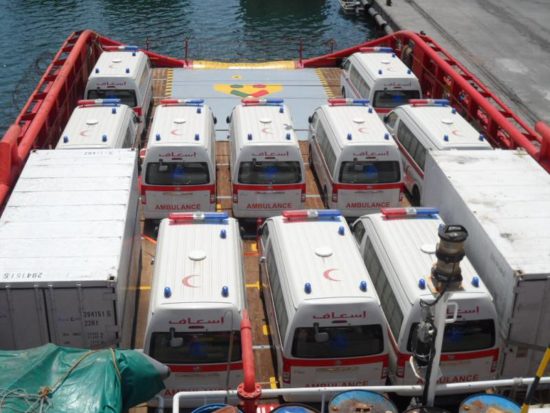Humanitarian Aid
Delivering life saving aid
In 2017, Agility responded to humanitarian crises around the world, notably in Peru and Yemen where flooding and disease took a cruel toll on property and life.
PERU
Earlier this year, Agility Peru responded to the Peruvian government’s special request for aid following massive flooding caused by an El Nino weather effect. More than 10 times the usual amount of rainfall hammered the region from December 2016 through April 2017 and caused Peru’s worst floods in 30 years.
Agility is a member of the World Economic Forum’s Logistics Emergency Teams (LET). LETs mobilizes when a country requests aid for humanitarian crises that are the result of a sudden natural disaster that affects more than 500,000 people. Even though Peru did not request international aid, Agility and two other members of LETs collaborated to donate assets and resources to the Peruvian government agencies that were organizing the disaster response operations.

The northwest regions of Peru, including Lambayeque and Piura, were struck hardest by flooding. Catastrophic conditions caused by rising water and mudslides destroyed more than 14,000 homes, 700 miles of road and 200 bridges. More than 150,000 people were left displaced and in need of humanitarian assistance. With the region’s infrastructure crumbling beneath rain and mud, it was a challenge to get supplies to those who needed them.
Agility Peru coordinated with the Peruvian Ministry of Production to move food, water, shelter, medicine, clothing and other necessary supplies to the communities cut off from the economic centre of Lima. Collecting more than 400 tons of aid material from Lima, Agility Peru transported supplies to the government’s central consolidation warehouse where they could be palletised and prepared for shipment from nearby airports. Then the Peruvian military transported the goods to disaster zones for distribution.
Peruvian President Pedro Pablo Kuczynski estimated that repairs to affected regions will cost $9 billion. That figure includes both immediate repairs as well as infrastructure planning to prevent future widespread damage from excessive rainfall. Recovering from a catastrophe that has resulted in more than 100 deaths and hundreds of thousands of displaced people takes time and careful planning; immediate logistical aid helps alleviate the current devastation so a nation can keep looking forward.
“When we received the request to assist with transporting supplies to the communities devastated by flooding, our Peru team was determined to help,” said Thomas Otersen, Chief Executive Officer of Agility Chile/Peru. “Using our freight forwarding, warehousing and supply chain expertise to assist with disaster relief is a natural extension of our day-to-day business and reinforces Agility’s core values. We were drawn to this challenge by a desire to aid our Peruvian neighbors, and we knew it was our responsibility as a locally positioned global provider.”
YEMEN
When Yemen faced a massive cholera outbreak affecting more than 500,000 people, the UN-led Logistics Cluster*, acting as logistics coordinator for the international humanitarian community, asked Agility for support in the form of a 20-foot refrigerated shipping container.

The container would be used to transport cholera treatment medication — specifically, a lactate solution that combats the effects of dehydration — to affected populations in Yemen. The Agility Dubai ocean freight team worked with four different container vendors to identify an appropriate model. Refrigerated containers (or reefers) are generally constructed with aluminium or steel panelling encasing about four inches of insulation. Inside, a motor runs a generator that supports on-board refrigeration. Agility procured the best reefer it could find and refurbished it for the mission in Yemen.
Before handing over the container, the Agility Dubai team tested its quality during a three-day trial. The container would need to reach and hold a steady temperature below 20 degrees Celsius, even in the steamy Gulf summer. Agility used temperature-monitoring equipment to observe conditions inside the container. Any increase in temperature is reported in real-time updates through this system, which ensures that temperature-sensitive cargo is delivered safely.
The refurbished reefer passed the temperature test, and Agility transported it on a vessel bound for the World Food Programme’s (WFP) Djibouti hub. There, it was handed over to the Logistics Cluster and placed on a WFP-chartered cargo vessel, VoS Apollo, where it was used to keep cholera treatment medication refrigerated while in transport to Yemen.
The reefer will remain in the Port of Aden as permanent onsite cold storage, coordinated by the Logistics Cluster. The Logistics Cluster is currently supporting the humanitarian response of 42 NGOs and UN agencies in Yemen and acknowledges the importance of the reefer in the response with temperature sensitive medication and a challenging climate.
*The UN-led Logistics Cluster provides technical and logistical support to ensure delivery of relief and humanitarian assistance in the aftermath of emergencies and natural disasters. The World Food Programme, the UN’s food agency, is lead agency for the Logistics Cluster.